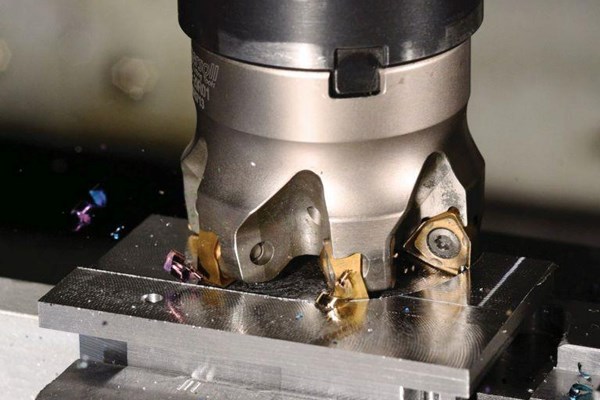Improving Tool Life by Turning off Coolant
In this case study, learn how retooling with the Di-Pos Hexa high-performance face mill from Ingersoll Cutting Tools and turning off the coolant helped McGill Machine Works achieve eight times the tool life of its previous inserts plus an 80 percent boost in throughput.
Share






ECi Software Solutions, Inc.
Featured Content
View More




Autodesk, Inc.
Featured Content
View More
An advanced coating on the Di-Pos Hexa face mill reduces friction and insulates the insert substrate from overheating, eliminating the need to use coolant.
Although it may seem counterintuitive, dry machining punishing materials was one step McGill Machine Works of Schaumburg, Illinois, took to remedy premature insert rupture. According to Ingersoll Cutting Tools field representative Jarett Johnson, cutting fluids can often create thermal shock that can crack the coatings on today’s high-performance inserts.
This was very important for McGill, which was in the process of retooling with Ingersoll’s Di-Pos Hexa high-performance face mill to rough-mill a high-chrome, D-2-wrought stock piece that serves as a wear part in a nail-gun mechanism. The insert’s advanced coating diverts machining heat into the chips as they are flung away from the cutting zone, leaving the tool and workpiece cooler, and making cutting fluids unnecessary, Mr. Johnson says.
Read more about McGill’s retooling process and how it was able to save the company about $10,000 a year in this article from our December issue.
Related Content
-
Quick-Change Tool Heads Reduce Setup on Swiss-Type Turning Centers
This new quick-change tooling system enables shops to get more production from their Swiss turning centers through reduced tool setup time and matches the performance of a solid tool.
-
Rego-Fix’s Center for Machining Excellence Promotes Collaboration
The new space includes a showroom, office spaces and an auditorium that will enhance its work with its technical partners.
-
Lyndex-Nikken Toolholders Offer Stable, Versatile Machining
Polygonal shank toolholders provide a rigid connection between the tool and machine — ideal for all processes both in turning and milling.






















.png;maxWidth=150)






.png;maxWidth=300;quality=90)



